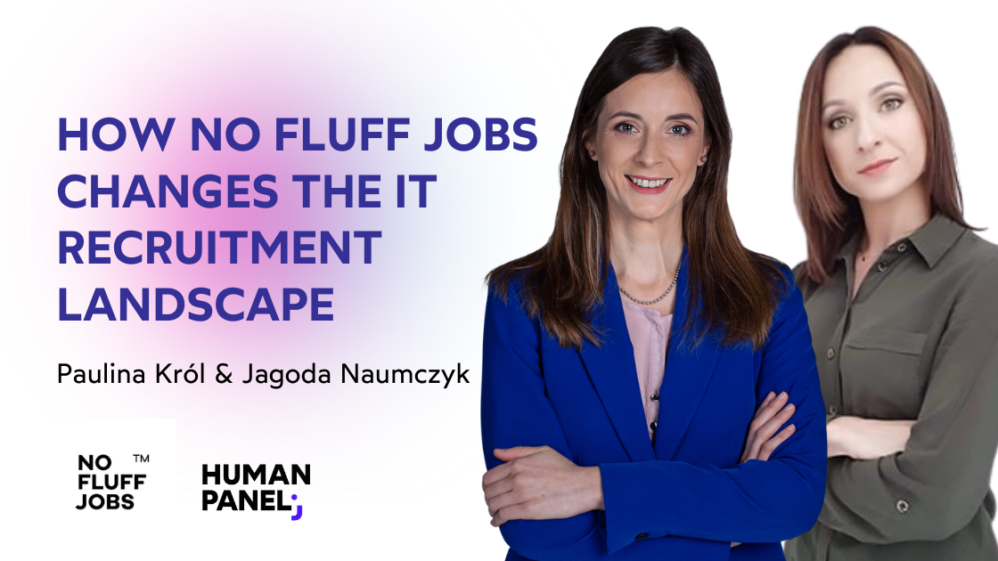9 top trends in HR that will shape the future of work
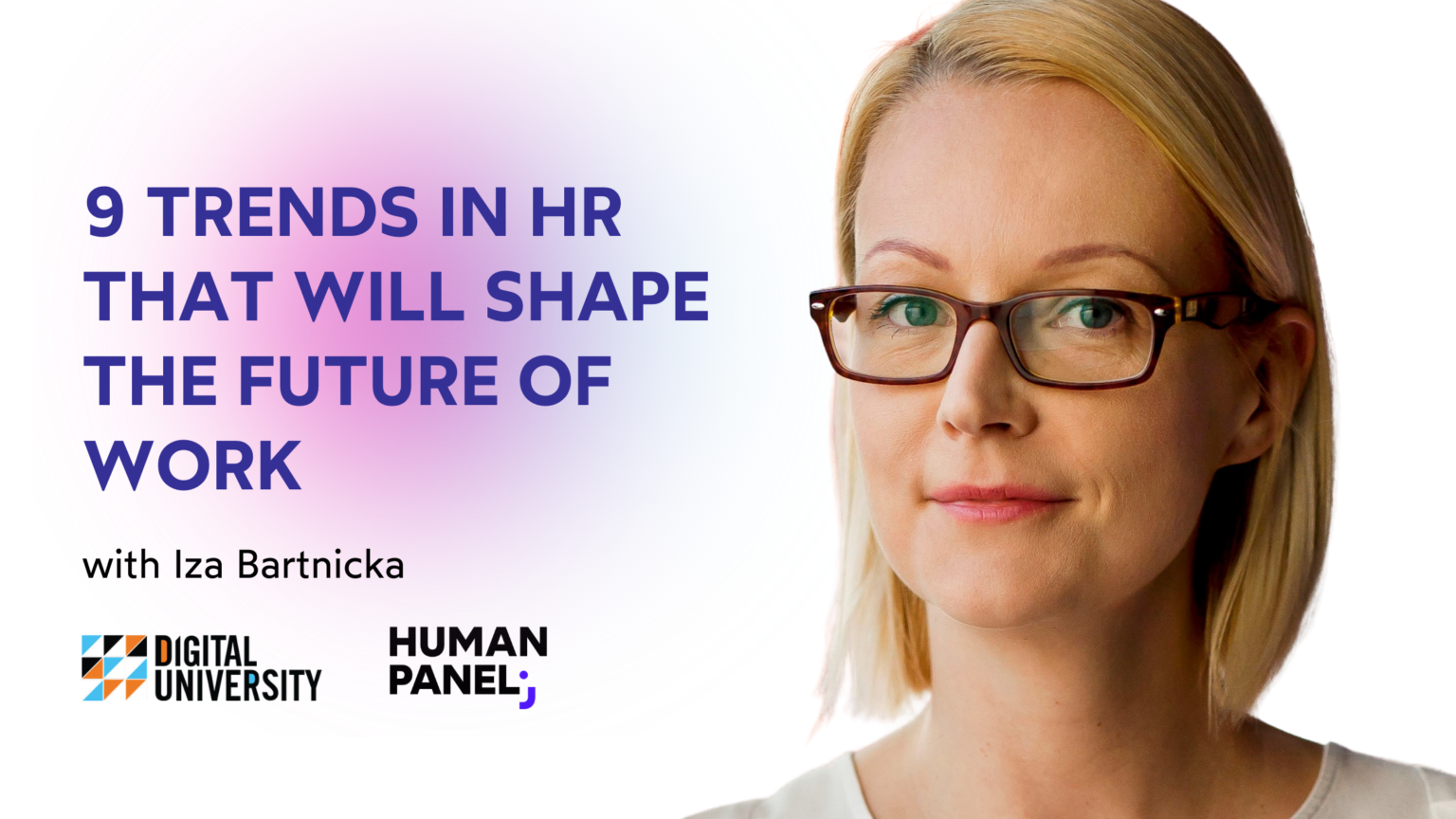
What tech trends will shape HR in 2022? We talk to Iza Bartnicka from Digital University about the technology in HR, the future of work and the Metaverse.
“It’s not that we use technology, we live technology,” said the American director Godfrey Reggio.The Covid 19 pandemic significantly accelerated the pace of technology adoption in many fields, and HR was no exception. The future of work has already arrived for a large portion of the workforce. Employers continue to digitize their work processes, prioritizing technologies such as cloud computing, AI, and big data.
How will these trends evolve in the coming months and years? Together with Iza Bartnicka, Head of Business Development at Digital University, we review the most important HR tech trends that will shape the future of work – our future.
1. Remote and hybrid future of work
In 2022, we will further experience a large-scale shift to remote working, driving a surge in work-from-home arrangements and a new market for remote work. More than 80% of employers emphasize that they plan to accelerate the digitization of the work process and provide more opportunities for remote working.
“The future of work has come faster than anyone expected,” says Iza Bartnicka. “The pandemic has driven digital transformation for many companies, and for some, it meant a real revolution. Employers faced the challenge of finding a way for efficient remote working. It was especially difficult for tasks and jobs that were considered impossible to do remotely.”
Of course, not everyone can work remotely – delivery personnel, healthcare workers, manufacturers, or grocery shop workers. Despite these limitations, the demand from employers for remote work is growing rapidly. It’s almost certain that remote and hybrid work will persist on a larger scale.
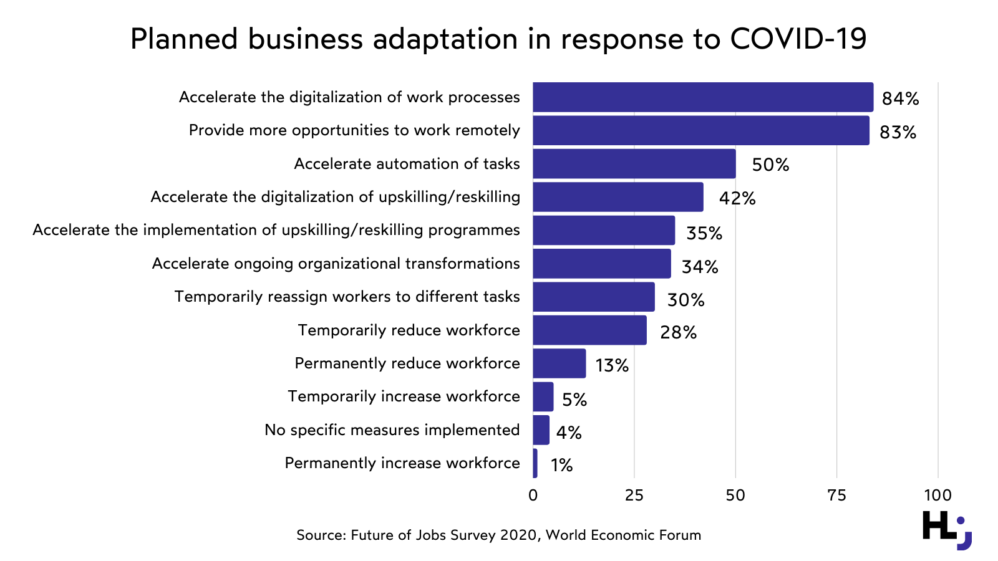
2. Cloud computing, automation, AI, and other technologies
The pace of technology adoption is high and will remain so as many business leaders see this as a priority. Some of the innovations are likely to trigger further disruption as new tools, such as automation, transform tasks, jobs and skills. 43% of employers say they will reduce their workforce due to technology integration. If the trend continues, by 2025, the amount of time people and machines spent on current tasks in the workplace will be the same.
“Most companies are heading towards further digitization, which includes cloud computing, automation, big data analytics, AI and cybersecurity. The biggest challenge in this is to prepare and engage people in the business so that they can adapt to the changes more easily. Companies need to address not only the adoption of the technology itself, but also the mindset of employees and their fear of new things. The crucial thing in this area is to prepare people for the change and equip them with the necessary tools and skills,” says Izabela Bartnicka.
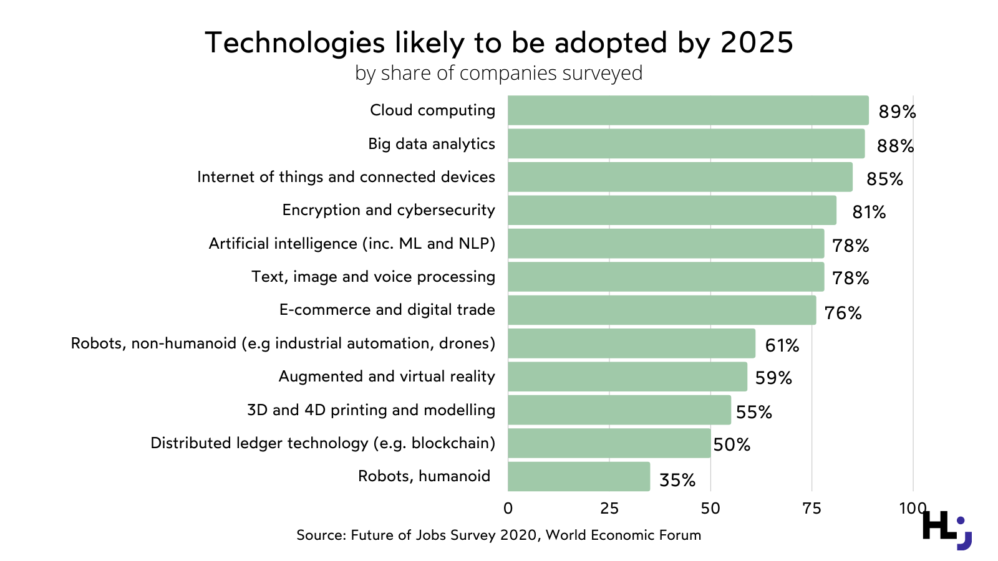
3. New jobs and skills
According to The Future of Jobs Report, 85 million jobs could disappear by 2025 due to the shift of labor between humans and machines. At the same time, 97 million new roles may emerge. It means that about 50% of us will need to reskill at some point.
“The appearance of new jobs means that employers will have to stop addressing current learning and development needs. They will need to look more to the future and teach people new skills. In this area, cognitive flexibility will play a crucial role. Those workers who are open to change will find it easier to adapt to a new reality,” adds Iza Bartnicka.
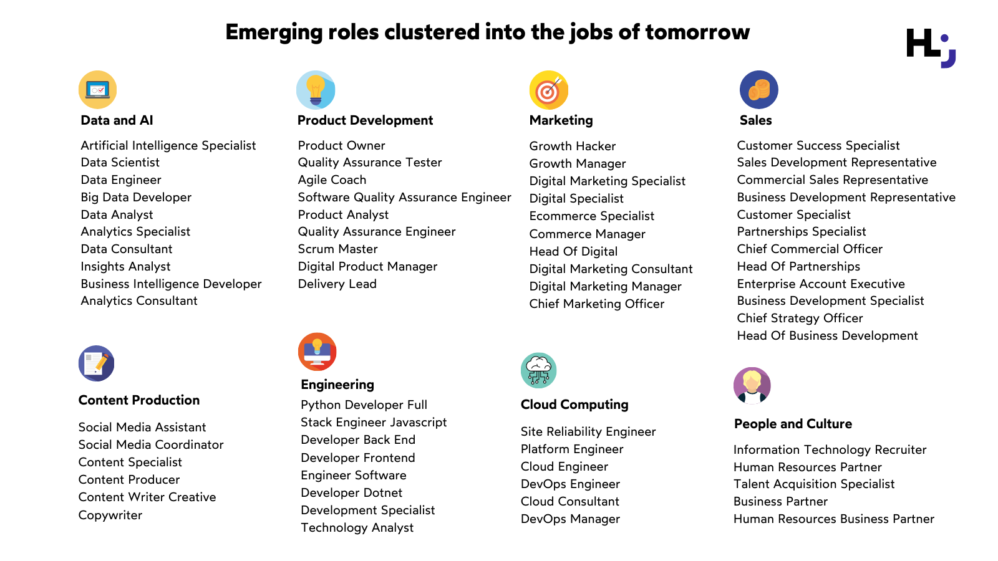
4.Skills-based workforce planning
As reskilling is becoming a key trend in employment, 94% of business leaders report that they expect their employees to learn new skills on the job (a significant increase from 65% in 2018). The competencies that are rising to prominence include critical thinking and analysis, active learning, problem solving, and self-management. The future of work means that many employers will begin to plan their hiring based on specific skill sets.
“To predict the future of work, it’s sometimes wise to look into the past. Ten years ago, social media specialist was a niche position; today, it’s a must-have, and many companies have dedicated social media teams. The evolution of technology, and digital and social media led to the emergence of new roles and people have learned most of what they know on the job. The same could happen in the next few years – we will see the evolution of new skills and practices live,” Iza Bartnicka comments.
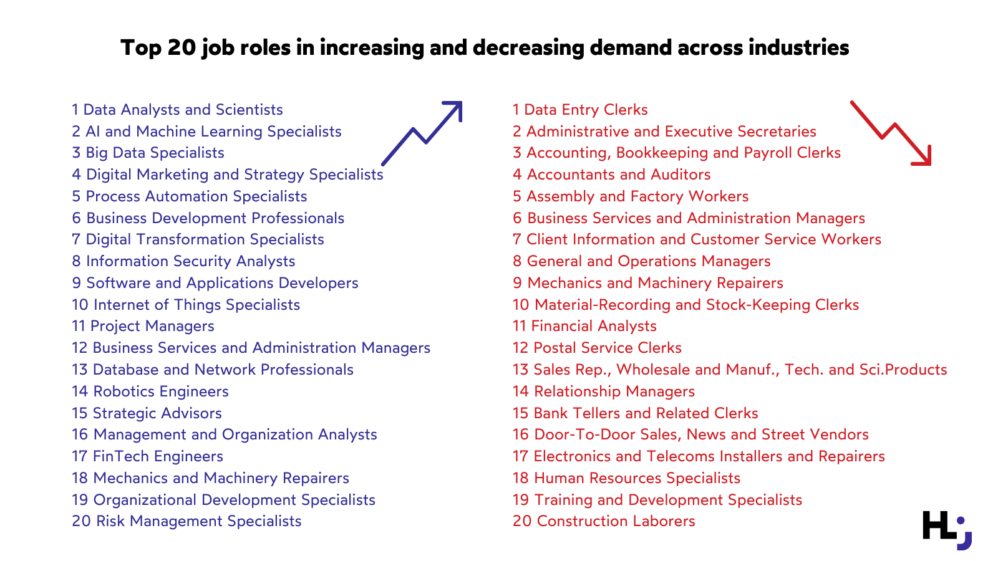
5.Synergy
Synergy and convergence will become an important trend in the future of work. The boundaries between traditionally isolated departments will begin to blur. According to Iza Bartnicka, some of them started converging a long time ago, for example sales and marketing. Now it’s time for other business units: Marketing and Technology, HR and Technology, HR and Data Science or HR and Marketing.
“Marketing and recruitment, for example, are closely linked. In both areas, we build brand awareness, reach people and turn them into ‘customers’. Also, HR can learn a lot from marketing in the area of data analytics,” says Iza.
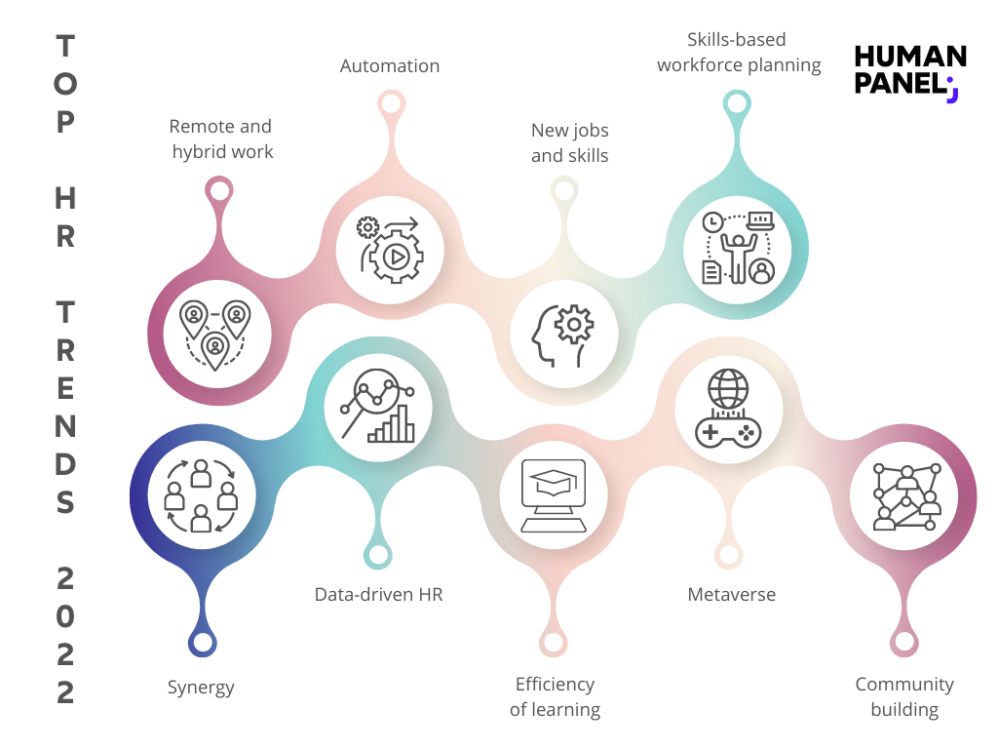
6.Data-driven HR
Data is becoming a key component for almost every industry – including HR. “Today, every HR team should have a data analyst on board, because the ability to collect, tidy, and analyze data is critical to a company’s success,” Iza comments.
“We live in a world of data and we need to know what we are measuring and the quality of the data we are using. The next step is to run descriptive and predictive analyses of that data and predict long-term outcomes.
Data is a new currency and HR needs to understand how to use it.
Iza Bartnicka, Digital University
The key is to build our expertise on qualitative, clean data and do more than just report the results. Collecting data should lead to providing actionable plans and forecasting trends for the future – all that to achieve company-wide business goals.”
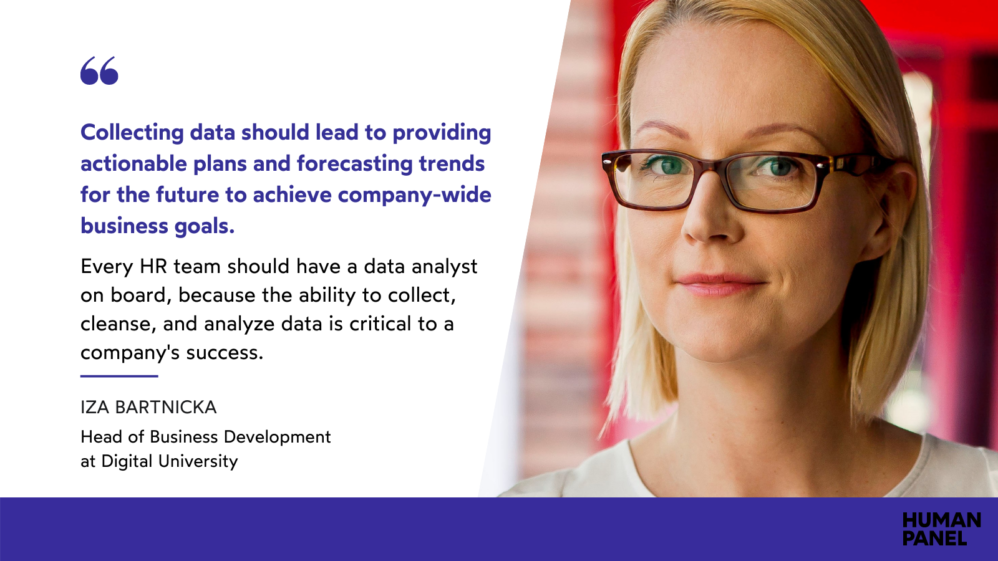
7. Measuring the efficiency of training
“Tracking the effectiveness of training and predicting ROI in this area is a complex task, but you can set measurable KPIs and measure the outcome. It’s particularly important, because we are always short of time. Technology makes us do more things, do more tasks, but at the same time it makes us faster. That’s why we have to constantly work on improving efficiency and invest in the training and development of our employees.
This is a big task for HR, which in this case should be a role model for the rest of the company and be among the first to adopt new solutions and learn new skills. HR leaders should make people comfortable with change – they should be ready to adopt change first.”
There is no shame in admitting that you do not know something – it is better to admit knowledge gaps, because then you can learn more and benefit from that knowledge.
Iza Bartnicka, Digital University
8.Metaverse
Metaverse has been one of the hottest topics lately, but the truth is that this technological breakthrough has been announced for some time. To explain what metaverse is, think of it as a combination of immersive virtual reality, online role-playing games, and the web. In other words, it’s a network of always-on virtual environments where people can interact with each other and with digital objects while controlling virtual representations – or avatars – of themselves.
“The metaverse may be the next big thing because of Facebook, but in reality we have been expecting it for years. It is likely that we will prepare marketing and recruitment campaigns in the metaverse in the foreseeable future,” says Iza Bartnicka.
“The pandemic has forced a change in the way we communicate. A few years ago remote work or virtual onboarding seemed impossible, while today they are the norm. We can experience the same with the Metaverse. Although it sounds like science fiction, it’s already a reality and could soon become as popular as social media.”
9.Community building
Although not purely a tech trend, community building is driven by tech solutions and the use of data. As Iza Bartnicka notes, collecting data through HR should not only serve to create a potential candidate pool, but also to develop a complex employer branding strategy.
“Such a mindset helps us warm up our potential candidates, offer them something, get them interested in the brand and turn them into “customers”. In this context, collecting data is crucial. We need to know who we are talking to, what appeals to them and what we can offer our future candidates. As I mentioned before, data is our new currency – all we have to do now is to use it wisely,” Iza Bartnicka concludes.
Get ready for the future of work with Human Panel! Connect you HR goals with business KPIs and measure and predict the ROI of your initiatives. Make sense of your employee data and get a story behind the numbers. Sign up for our free demo and answer questions that are critical to your business.
Discover all Human Panel features

